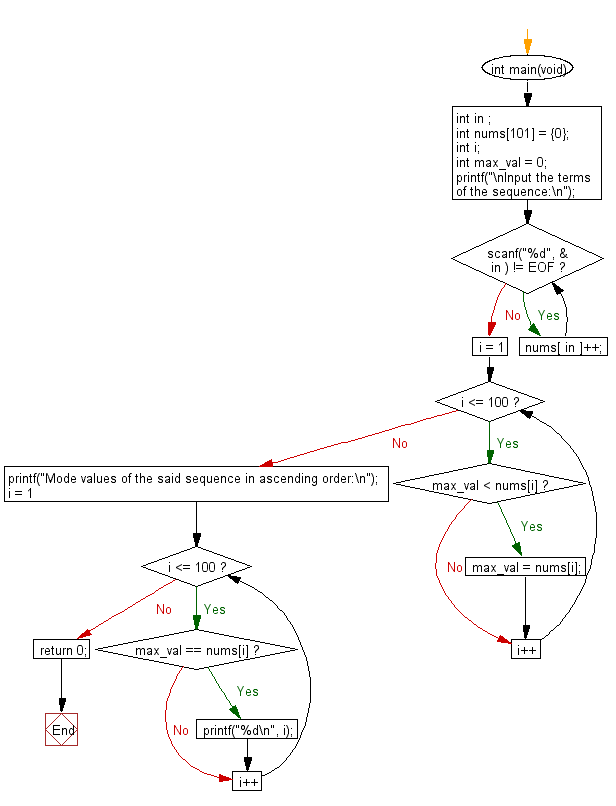C Exercises: Find the element(s) which occurs most frequently in a given sequence
C Basic Declarations and Expressions: Exercise-140 with Solution
Write a C program to which reads a sequence of integers and find the element which occurs most frequently.
Sample Solution:
C Code:
#include <stdio.h>
#include<stdlib.h>
#include<math.h>
#include<string.h>
int main(void) {
int in ;
int nums[101] = {0};
int i;
int max_val = 0;
printf("\nInput the terms of the sequence:\n");
while (scanf("%d", & in ) != EOF)
nums[ in ]++;
for (i = 1; i <= 100; i++) {
if (max_val < nums[i])
max_val = nums[i];
}
printf("Mode values of the said sequence in ascending order:\n");
for (i = 1; i <= 100; i++) {
if (max_val == nums[i])
printf("%d\n", i);
}
return 0;
}
Sample Output:
Input the terms of the sequence: 5 2 4 6 8 10 ^Z Mode values of the said sequence in ascending order: 2 4 5 6 8 10
Flowchart:

C programming Code Editor:
Contribute your code and comments through Disqus.
Previous: Write a C program to find the maximum sum of a contiguous subsequence from a given sequence of numbers a1, a2, a3, ... an ( n = number of terms in the sequence).
Next: Write a C program that reads n digits (given) chosen from 0 to 9 and prints the number of combinations where the sum of the digits equals to another given number (s). Do not use the same digits in a combination.
What is the difficulty level of this exercise?
Test your Programming skills with w3resource's quiz.
C Programming: Tips of the Day
Static variable inside of a function in C
The scope of variable is where the variable name can be seen. Here, x is visible only inside function foo().
The lifetime of a variable is the period over which it exists. If x were defined without the keyword static, the lifetime would be from the entry into foo() to the return from foo(); so it would be re-initialized to 5 on every call.
The keyword static acts to extend the lifetime of a variable to the lifetime of the programme; e.g. initialization occurs once and once only and then the variable retains its value - whatever it has come to be - over all future calls to foo().
Ref : https://bit.ly/3fOq7XP
- New Content published on w3resource:
- HTML-CSS Practical: Exercises, Practice, Solution
- Java Regular Expression: Exercises, Practice, Solution
- Scala Programming Exercises, Practice, Solution
- Python Itertools exercises
- Python Numpy exercises
- Python GeoPy Package exercises
- Python Pandas exercises
- Python nltk exercises
- Python BeautifulSoup exercises
- Form Template
- Composer - PHP Package Manager
- PHPUnit - PHP Testing
- Laravel - PHP Framework
- Angular - JavaScript Framework
- Vue - JavaScript Framework
- Jest - JavaScript Testing Framework
